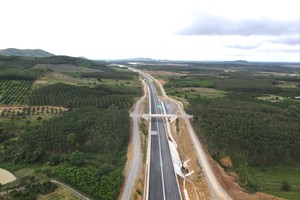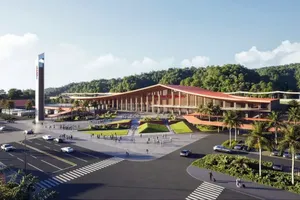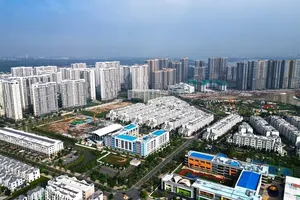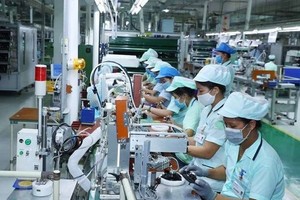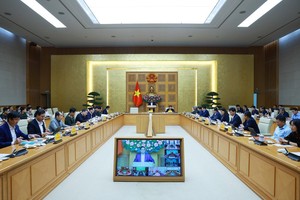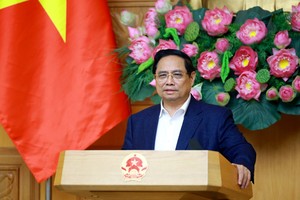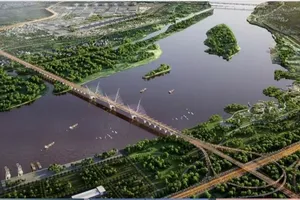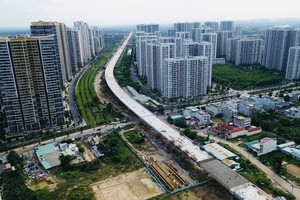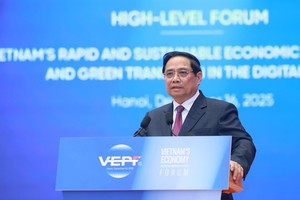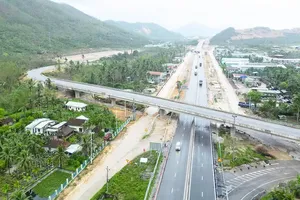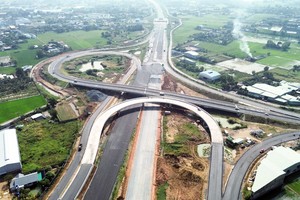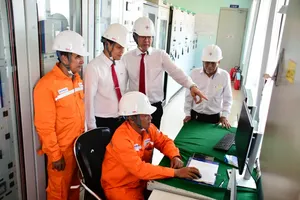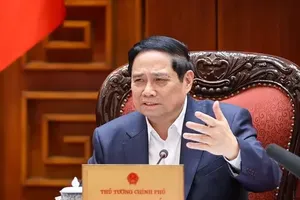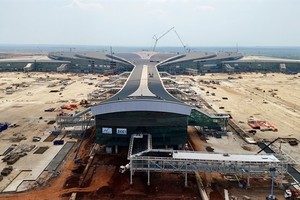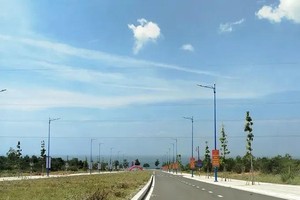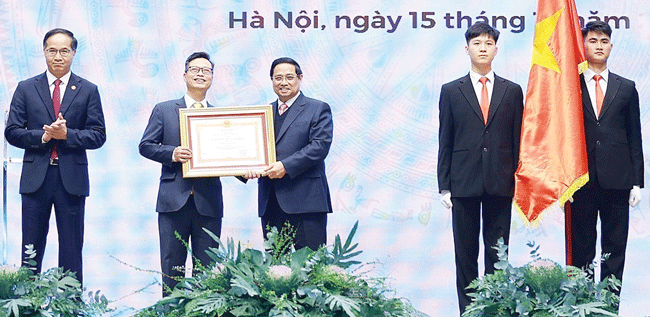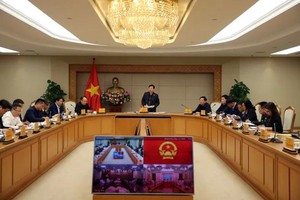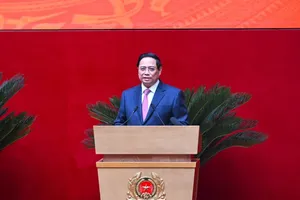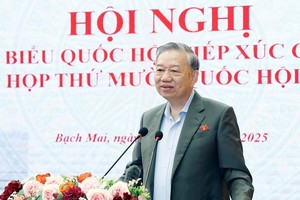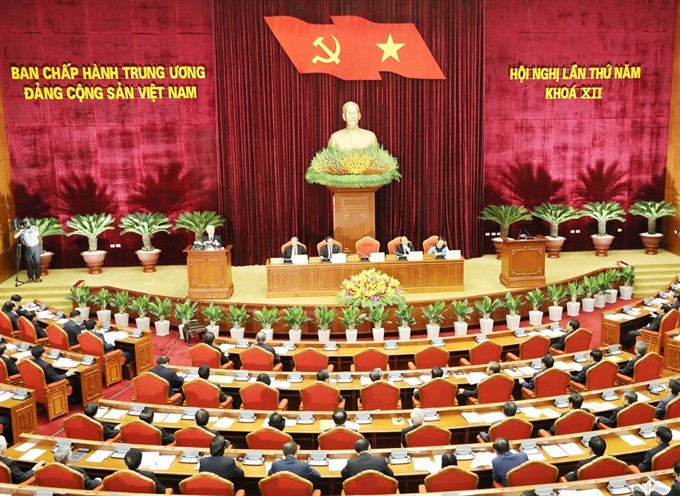
During the meeting, the Central Committee will debate improving socialist-oriented market economy institutions and rearranging, reforming and improving State-owned enterprises.
The committee will also review the implementation of the 15-year-old 9th Party Central Committee’s Resolution on the development of the private economic sector and will consider disciplinary measures against several Party members.
Speaking at the opening ceremony, Party General Secretary Nguyen Phu Trong suggested several issues to be discussed at the session.
Over the past 10 years, implementation of the Resolution of the sixth plenum of the 10th Party Central Committee on “continuing to complete the socialist-oriented market economy mechanism” has contributed to economic growth and Vietnam’s shift from the group of less developed countries to the group of developing countries with middle income. It has also helped maintain the country’s socialist orientation and developed the economy along with social progress, while improving people’s life and ensuring social welfare and defence.
However, he pointed out shortcomings, especially in achieving sustainable economic growth, a lack of breakthroughs in using resources for development, State-owned enterprises failing to perform, slow economic reforms and the slow development of some markets.
The Party chief said the conference’s task is to issue a new resolution for the continued completion of the socialist-oriented market economy mechanism to 2020 with a vision to 2030 on the basis of the 12th Party Congress’ Resolution and the Resolution of the sixth plenum of the 10th Party Central Committee.
He asked the Central Committee to analyse weaknesses in the work and map out resolutions.
On the issue of State-owned enterprise efficiency, he said the Party and the State have often discussed and issued various policies to re-organise, reform and develop State-owned enterprises (SOEs), reaping positive results, noting that the number of firms wholly owned by the State had dropped from over 12,000 to 5,655 in 2001 and 718 in October 2016.
However, SOEs have neither proved the core of the State economy nor led and created growth momentum. Most SOEs’ business performance remains low and is not commensurate with the resources the State has invested. A number of SOEs suffered losses, experienced corruption and wastefulness or invested in multi-trillion dong but idle projects, worsening bad debt and public debt.
Party leader Trọng asked members of the Party Central Committee to point out reasons for sluggish improvement of these longstanding issues.
He stressed that at this session, the need was to pinpoint targets, viewpoints and solutions to address this issue. Further, a consensus had to be reached on the role of SOEs amid equitisation and divestment of State capital at businesses completely owned by the State.
He said members also had to look into ways to reform the firms’ apparatus and operations, as well as personnel work and the activities of Party organisations at SOEs.
He asked members to scrutinise the need to issue a new resolution from the Party Central Committee on SOE restructuring, reform and improvement.
Over the past 15 years of implementing the resolution on renovating mechanisms, policies and facilitating the private economy adopted by the fifth plenum of the ninth National Party Congress, the Party and the State have issued a number of policies, guidelines and measures to encourage the development of the private economy.
The private economy has made greater contributions to rallying social resources for manufacturing and trading, economic growth and restructuring, increasing State budget collection and creating jobs, as well as improving local well-being, ensuring social welfare and settling social issues. Its contribution to gross domestic product is stable at nearly 39-40 percent. Entrepreneurship has grown, as has the start-up movement.
However, the private economy’s growth rate has fallen in recent years due to limited capacity, mostly in individual and household businesses. Various private firms are operating in an unstable manner and face losses, dissolution and bankruptcy. Law violations, trade fraud, tax avoidance and debt, and unhealthy competition, as well as environment pollution, and food hygiene remain serious issues.
The Party chief asked the Party Central Committee to assess past achievements and thoroughly analyse shortcomings and weaknesses.
Following the resolution set by the 12th National Party Congress and keeping in mind the country’s situation, the Party Central Committee needed to reach consensus with the Party and the people on goals, major tasks and measures to develop a strong private economy, making it the driver of the country’s socialism-oriented market economy, he said.
Regarding self-criticism, the Party chief said that in March 2017, the Politburo and the Secretariat spent seven days being critical of the leadership and steering work in 2016, as well as on the implementation of the resolution on Party building and rectification adopted by the fourth Party Central Committee (12th tenure).
The work was carried out in a democratic, frank, and sincere manner and those who were criticised listened seriously, seeing it as a chance to learn, he said.
Each Politburo and Secretariat member reviewed his or her responsibility for fields they were in charge of and acknowledged weaknesses or limitations they should fix, according to the Party leader.
Through the work, the Political Bureau and the Secretariat agreed that in 2016, the regional and international situation faced complicated developments, while the country dealt with new incidents such as marine environmental pollution in the central coastal area, severe droughts in the south central and the Central Highlands and saltwater intrusion in the Mekong delta.
In this context, the Politburo and the Secretariat stood united and promptly issued appropriate solutions to lead the Party, people and army to reap important achievements, which had been lauded by the people, Party members and officials, he noted.
The achievements gained in 2016 were encouraging, paving the way for the country to enter a new development phase, Trong said.
He asked the Party Central Committee to correctly assess strong and weak points in the leadership, steering work of the Politburo and the Secretariat and the implementation of the resolution on Party building and rectification adopted by the fourth Party Central Committee (12th tenure). He said the committee should point out causes and lessons learnt and devise solutions to address weaknesses.
